
Natasha Nel, Organisational Development Specialist at South Africa’s University of the Free State, tells us about the positive effect that the pandemic has had on performance management. She also reveals how her HR department stepped up its approach to Wellbeing, and muses about technology’s potential for supporting more meaningful working experiences.
What have been the most important developments in HR during your time in the industry?
Employee experience has become a major focus, whereas it never used to be. The industry has also evolved through the widespread adoption of psychometrics. Everyone uses psychometrics now. We never used to use assessments in development programmes. That is something new.
Assessments have also really changed our role when it comes to performance management. They now form an integral part of development plans and the recognition platform that we recently introduced, partially in response to the results of the Engage survey. This platform is used to recognise and promote positive behaviours that support individual, team, divisions, and departments in achieving the University’s vision and goals.
We also use data more proactively. For example, the feedback from our wellbeing sessions now identifies needs among our staff members before problems develop. From my perspective, HR has moved from its traditional administrative function to become much more data-driven, which has contributed to the wellbeing of our people at the university. This is the direction in which we are moving.
Have there been any HR trends that you think were a mistake?
The traditional style of micromanagement, performance management and clock watching. That really needed to change. Working culture needed to become more trust based. As the ‘baby boomers’ move through the workplace and new generations come in, working culture and employee expectations are changing.
I think that at the university, the pandemic created an opportunity for employees to work from home without fear of reprisal. We have arrived at a new model of performance management which allows us to support much more flexibility. Before the pandemic, we used to be quite traditional, and people have reacted differently to remote working. We use psychometrics to optimise the way we work. They act as a guide, which allows us to offer staff greater independence and flexibility.
"We use psychometrics to optimise the way we work."
- Natasha Nel, Organisational Development Specialist
How did the pandemic change the way you work?
During the pandemic, we assessed employee resilience and wellbeing. The majority indicated that they enjoyed working from home, but some felt that there was more interference. We also noticed that the workload increased since we started working from home. We have implemented our work from home arrangement in a structured manner, with clear communication of the guidelines for at-home working. We did see that a lack of open communication negatively impacts employee wellbeing. The PPA analysis and other assessments have really supported us in implementing this change in a way that meets the needs of our workforce.
"We will use technology to ensure that we create a meaningful experience."
- Natasha Nel, Organisational Development Specialist
What will the future of work look like?
I think the university may investigate a blended approach to remote working. There are people within the university researching technologies such as Artificial Intelligence (AI). You can see that we need to be conscious of the way that they are developed. In a very immediate sense, we’ve noticed that some people get Zoom fatigue, for instance.
We also see people missing the social connection that in-person work provides. At the university I think that things like AI will be used in a supportive way to inform our onboarding or our development programmes which are increasingly focused on upskilling and reskilling. I think we will use technology to ensure that we create a meaningful experience for people at work.



